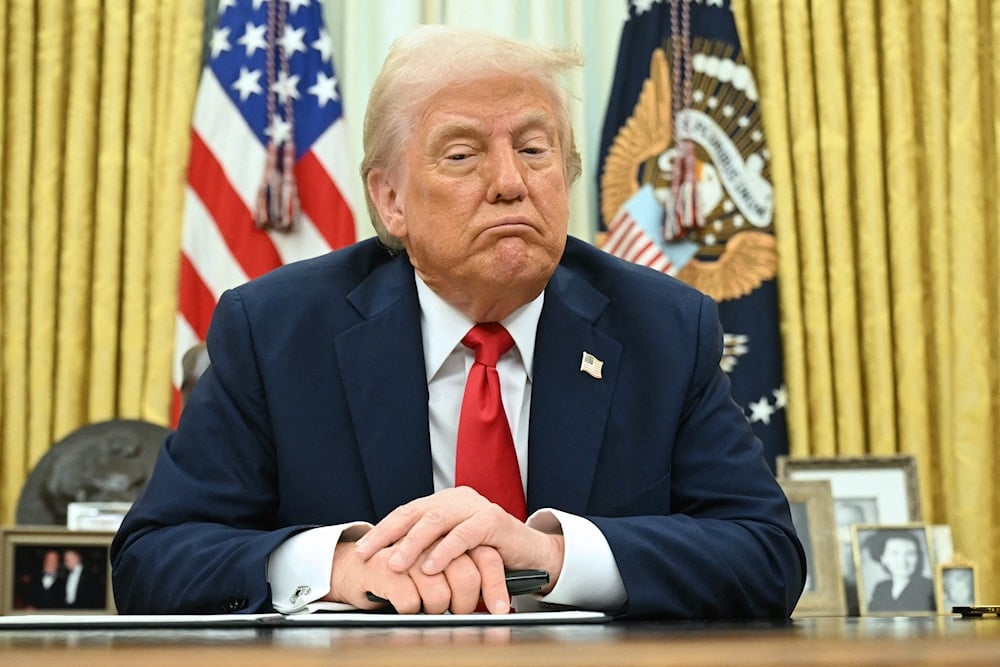Trump weighs Iran’s offer for indirect nuclear talks: Axios
Within the Trump administration, there is ongoing debate between those who believe a deal is achievable and those who dismiss negotiations as futile and advocate for strikes on Iran.
-
 US President Donald Trump speaks as he signs an executive order targeting ticket scalping in the Oval Office of the White House in Washington, DC, on March 31, 2025 (AFP)
US President Donald Trump speaks as he signs an executive order targeting ticket scalping in the Oval Office of the White House in Washington, DC, on March 31, 2025 (AFP)
The White House is seriously evaluating an Iranian proposal for indirect nuclear negotiations while significantly expanding US military forces in the Middle East, preparing for potential military action if President Donald Trump opts for strikes, Axios reported, citing two US officials.
Although Trump has expressed a preference for reaching a deal, he has also warned that failure to do so would lead to "bombing". He set a two-month deadline for Iran to negotiate an agreement, but it remains unclear when that countdown began.
Within the US administration, there is ongoing debate between those who believe a deal is achievable and those who dismiss negotiations as futile and advocate for strikes on Iran’s nuclear facilities, the report revealed.
Over the weekend, Trump received Iran’s official response to the letter he sent the Leader of the Islamic Revolution, Sayyed Ali Khamenei, three weeks earlier, according to a US official. While Trump proposed direct negotiations, Iran agreed only to indirect talks mediated by Oman.
US open to Oman serving as mediator
The US official highlighted that while the administration considers direct talks more likely to succeed, it is open to Iran’s proposed format and does not oppose Oman serving as a mediator, as it has in the past.
Both US officials emphasized that no final decision has been made and internal discussions continue. "After the exchange of letters we are now exploring next steps in order to begin conversations and trust building with the Iranians," one official stated.
Tensions between Washington and Tehran had already been escalating before Trump’s Sunday warning that failure to reach a deal would result in US strikes on Iran.
On Monday, Sayyed Khamenei responded, stating he does not believe the US will attack Iran but warned that if it does, "they will certainly receive a heavy blow in return."
Iran also lodged a formal diplomatic protest through the Swiss embassy, given the absence of US-Iran diplomatic relations, cautioning that it would respond "decisively and immediately" to any threat.
Moreover, Ali Larijani, senior advisor to Sayyed Khamenei, warned that any US or Israeli attack on Iran under the pretext of its nuclear program would force Tehran to move toward producing nuclear weapons.
Trump unilaterally withdrew from the 2015 nuclear agreement, arguing that his “maximum pressure” strategy would force Iran into a better deal. However, neither he nor President Joe Biden secured a new agreement.
In the meantime, Iran has significantly advanced its uranium enrichment program, reaching a nuclear threshold status, though Tehran insists it does not seek to develop nuclear weapons.
Iran has also refused to negotiate on non-nuclear issues, including its missile program, which Trump’s administration had previously insisted must be part of any talks.
Pentagon expands Middle East militarization with warplanes, carrier
On Tuesday, the Pentagon announced additional troop deployments and the extension of two aircraft carriers, USS Truman and USS Vinson, in the region.
Last week, several B-2 stealth bombers were dispatched to the Diego Garcia military base in the Indian Ocean. A US official said this deployment was “not unrelated” to Trump’s two-month deadline for Iran.
These bombers, capable of carrying large bunker-buster bombs, would play a crucial role in any potential strikes on Iran’s underground nuclear facilities.
"Should Iran or its proxies threaten American personnel and interests in the region, the U.S. will take decisive action to defend our people," Pentagon spokesperson Sean Parnell warned.
A US official indicated that while Trump is not seeking war with Iran, he believes that strengthening military deterrence is essential for negotiations and to ensure readiness if talks collapse and tensions escalate rapidly.
Read more: US-Iran war would set entire region ablaze: Iraqi official

 4 Min Read
4 Min Read








